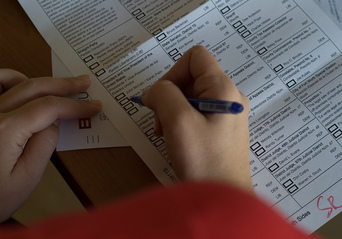
I’ve never really understood people who say the idea of Election Day — one set day in which everyone, other than a limited group of absentees, must vote — is something inherently sacred in a democracy.
It’s very much like the arguments I’ve had through the years with people who say reading an ebook is an inherently inferior experience to reading a
| | regular book because of the aesthetic experience of holding and smelling (yes, smelling!) the paper. The words are what makes a book good or bad, not the delivery method. And the act of casting a ballot is what lends a moral component to the civic duty of voting, not the day on which the ballot is cast. That said, however, I find myself wandering to the side of the Election Day traditionalists this week as I hear reports of people already casting ballots in several states. What on earth are they thinking? Two debates remain between presidential candidates and one between the vice presidential candidates. But even if these voters’ minds are immovably made up on that race, there are countless debates remaining between candidates for state and congressional offices in these states, as well as arguments to be made for and against ballot issues and state constitutional amendments. Those who cast ballots today are saying none of these things matter. They’ve made up their minds, thank you. If a candidate for their House district is found next week to have stuffed the dismembered remains of former lovers in the refrigerator, it would be too late for these folks. Their ballots are cast. Their minds are made up, based on … what? Incomplete information, at best. So much can happen during the last few weeks of an election. The vast majority of voters have to struggle, at best, to understand the character and positions of candidates. Why not wait to get as much of that information as possible before getting in front of the touch screen? Of course, there are plenty of good reasons to allow early voting. Not everyone is available to stand in a long line on Election Day. The elderly or infirm should have a chance to vote easily by mail when it suits them best. These are rational reasons. If we had the technology, it might be interesting to allow people to cast, and then change, their votes up to a certain deadline. This certainly would make debates more interesting, as TV networks show the tallies changing back and forth with each answer given. But I still reject the argument, articulated recently in the Christian Science Monitor by advertising creative director Jim Sollisch, that there is somehow something more democratic about everyone having to come together on the same day. He said, “I understand that it’s no less a vote if you do it from your kitchen table while you pay your monthly bills. It seems to me it’s just less a joy and more a chore. We have so few opportunities these days to stand shoulder to shoulder with other citizens. We live so much of our lives online, where it’s easy to practice the First Amendment with the click of a button but difficult to participate in real discourse.” To me, that’s an emotional reason. We should allow early voting for convenience sake, and for the sake of making democracy more accessible. But for heaven’s sake make it for a more limited time period; and for the sake of democracy, wait as long as you possibly can before casting the ballot. |

 RSS Feed
RSS Feed

